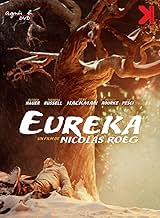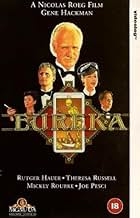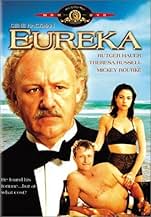IMDb RATING
5.9/10
4.1K
YOUR RATING
In 1925, a lone and obsessed Arctic prospector Jack McCann finally strikes gold. Twenty years later, he begins spiraling out of control when his only daughter becomes engaged to a man he str... Read allIn 1925, a lone and obsessed Arctic prospector Jack McCann finally strikes gold. Twenty years later, he begins spiraling out of control when his only daughter becomes engaged to a man he strongly dislikes.In 1925, a lone and obsessed Arctic prospector Jack McCann finally strikes gold. Twenty years later, he begins spiraling out of control when his only daughter becomes engaged to a man he strongly dislikes.
- Director
- Writers
- Stars
- Awards
- 1 nomination total
- Director
- Writers
- All cast & crew
- Production, box office & more at IMDbPro
Featured reviews
Weird, sloppy, self-indulgent, meta-physical, sometimes boring, sometimes hallucinatory: all these things describe this misfire from director Nicolas Roeg. Gene Hackman stars as a gold prospector in Alaska during the final days of the gold rush. Most of the people have given up and gone home at this point, but Hackman refuses. After a strange encounter with a meteor (I think) he receives some kind of lucky rock (I think) that gives him the extra push to find his gold strike. And does he ever. Cut to decades later, and he's fabulously wealthy, with a giant estate named Eureka. His grown daughter (Theresa Russell) has married a European playboy (Rutger Hauer) that dad doesn't approve of. There's also a shady consortium of some sort, headed by Jewish tough guy Joe Pesci (!) and represented by Italian lawyer Mickey Rourke (!), that needs Hackman's financial backing for some new endeavor.
The cinematography is beautiful, as it usually is in Roeg's films, but the plot is a mess of ham-handed symbolism and uninspired dramatics. The terrific cast, which also includes Ed Lauter, Joe Spinell and Corin Redgrave, is good, with Hackman the stand-out, as usual. Rourke looks scared and uncomfortable, which fits with his character, but he comes across more like he's fully aware of how wrong he is in the role. Russell and Hauer are both beautiful, and they both spend much of the film in various states of undress. There's also one of the most brutal, protracted murder scenes I've seen in a film in a long time. It's starts off shocking, but becomes rather ludicrous the longer it's dragged out. I can't really recommend this film to anyone except Hackman fans or fans of bizarre obscurities.
The cinematography is beautiful, as it usually is in Roeg's films, but the plot is a mess of ham-handed symbolism and uninspired dramatics. The terrific cast, which also includes Ed Lauter, Joe Spinell and Corin Redgrave, is good, with Hackman the stand-out, as usual. Rourke looks scared and uncomfortable, which fits with his character, but he comes across more like he's fully aware of how wrong he is in the role. Russell and Hauer are both beautiful, and they both spend much of the film in various states of undress. There's also one of the most brutal, protracted murder scenes I've seen in a film in a long time. It's starts off shocking, but becomes rather ludicrous the longer it's dragged out. I can't really recommend this film to anyone except Hackman fans or fans of bizarre obscurities.
Of the Nicolas Roeg films I've seen thus far "Eureka" is in many ways the most conventional. Probably this is due to its being based on real-life events, to wit, the horrific murder in his palatial house of a powerful and super-wealthy man just as the Second World War is nearing its close.
Before we get to that, there's an eerie, atmospheric prologue set in the Yukon twenty years earlier where Gene Hackman's Jack McCann character achieved his one goal in life, to strike gold and become rich beyond his wildest dreams. Fast forward those twenty years and he's married to his now dissolute wife, Jane Lapotaire with an impulsive adult daughter, played by Theresa Russell, waited on hand and foot, living the life of luxury on his own private island in the Bahamas named Eureka after the word he uttered when making his lucky strike.
But of course, great wealth doesn't guarantee great happiness and so Jack's peace of mind is beset on two fronts. Firstly his impressionable daughter has fallen in with a handsome, libertine go-getter, Rutger Hauer's titled Frenchman Claude van Horn. Jack thinks Claude is literally a gold-digger and is provoked to extreme rage and violence against him when he learns the couple have secretly married. His other concern is that he's being pressurised by his up till now trusted business partner who's now in tow to a shady mobster who wants to open up Eureka to gambling, like a second Cuba.
How this self-made man confronts head-on both of these problems and the disastrous consequencies which follow, determines the outcome of the movie, culminating in his horrific killing and the subsequent trial of van Horn, the verdict coincidentally falling due on the day the war actually ends.
Like I said, this Roeg film is perhaps easier to follow than others in his catalogue, but naturally he throws in a few curve-balls along the way and elsewhere demonstrates his undoubted directorial bravura. The depictions of sex and violence are graphic, especially the drunken orgy scene masterminded by van Horn and the nightmarish slaying of McCann in his own bed but these are contrasted with the opulent depiction of the trappings of wealth and the matter-of-fact gravity of the extended courtroom trial.
I personally felt that rather like McCann himself, the film peaks at the moment he hits the motherlode, in a remarkably staged scene with McCann literally awash in his new wealth. There are strong performances by Hackman, and Hauer, in particular with Joe Pesci warming up on the sidelines for his future gangster roles under the direction of Scorcese.
Yes, the film is uneven with occasionaly overripe dialogue and some confusing plot-shifts but it certainly works as a study of greed, power and the corruption of wealth.
Perhaps the moral here is that it's better just to let the rainbow fade rather than chase the pot of gold you imagine is at the end of it.
Before we get to that, there's an eerie, atmospheric prologue set in the Yukon twenty years earlier where Gene Hackman's Jack McCann character achieved his one goal in life, to strike gold and become rich beyond his wildest dreams. Fast forward those twenty years and he's married to his now dissolute wife, Jane Lapotaire with an impulsive adult daughter, played by Theresa Russell, waited on hand and foot, living the life of luxury on his own private island in the Bahamas named Eureka after the word he uttered when making his lucky strike.
But of course, great wealth doesn't guarantee great happiness and so Jack's peace of mind is beset on two fronts. Firstly his impressionable daughter has fallen in with a handsome, libertine go-getter, Rutger Hauer's titled Frenchman Claude van Horn. Jack thinks Claude is literally a gold-digger and is provoked to extreme rage and violence against him when he learns the couple have secretly married. His other concern is that he's being pressurised by his up till now trusted business partner who's now in tow to a shady mobster who wants to open up Eureka to gambling, like a second Cuba.
How this self-made man confronts head-on both of these problems and the disastrous consequencies which follow, determines the outcome of the movie, culminating in his horrific killing and the subsequent trial of van Horn, the verdict coincidentally falling due on the day the war actually ends.
Like I said, this Roeg film is perhaps easier to follow than others in his catalogue, but naturally he throws in a few curve-balls along the way and elsewhere demonstrates his undoubted directorial bravura. The depictions of sex and violence are graphic, especially the drunken orgy scene masterminded by van Horn and the nightmarish slaying of McCann in his own bed but these are contrasted with the opulent depiction of the trappings of wealth and the matter-of-fact gravity of the extended courtroom trial.
I personally felt that rather like McCann himself, the film peaks at the moment he hits the motherlode, in a remarkably staged scene with McCann literally awash in his new wealth. There are strong performances by Hackman, and Hauer, in particular with Joe Pesci warming up on the sidelines for his future gangster roles under the direction of Scorcese.
Yes, the film is uneven with occasionaly overripe dialogue and some confusing plot-shifts but it certainly works as a study of greed, power and the corruption of wealth.
Perhaps the moral here is that it's better just to let the rainbow fade rather than chase the pot of gold you imagine is at the end of it.
Roeg draws on Who Killed Sir Harry Oakes, as well as Skakespeares tempest and some Robert Service to create this tale of a man who "once had the world, now i just have the everything". a film of thems and more subplots than plot-and many themes. hackmann is a perfect Roeg actor-like Sutherland, Fox and Bowie, but some other performances are not as comfortable, or not as well written -particularly the women. A film that is worth repeated viewing
I too first saw this in London when it came out May 1983, at the Screen on the Hill. It was my O-level year, and I was a skinny, awkward 15-year-old, desperately trying to get into my first 18-rated film. It worked. But was it worth it? The film has an extraordinary opening section, as Gene Hackman finds the gold under the snow-encrusted earth, culminating in a spectacular, slow-motion explosion of rock and snow. Set to extracts of Wagner's DAS RHEINGOLD, it's unforgettable, thrilling cinema, and had my jaw dropping into my cappuccino. We also have the sight of a dying, half-frozen man blowing his brains out again and again, bringing to mind the disjointed, hallucinatory quality one recognises from the director of THE MAN WHO FELL TO EARTH and DON'T LOOK NOW. Stunning, disturbing stuff.
Unfortunately the momentum quickly slackens as we cut forwards in time to a rather dull, plodding melodrama about a Kane-like man who in his anguish says, "Once I had it all...now I only have everything." (Coming after the prologue, this also applies to the film itself.) There's some nasty scenes involving voodoo and Rutger Hauer doing something rather strange with a python, some gut-wrenching violence involving a blow-torch and the contents of a pillow, and a soap-opera court-room finale that feels as if it's wandered in from an entirely different film altogether. There are rumours of a different film lurking in this exuberant mess: one of the film's stars has hinted that it was not Roeg's final version that we saw. But I couldn't call this a success. Roeg fans should check it out as an oddity, but be warned: after the brilliant beginning, it's downhill all the way.
Unfortunately the momentum quickly slackens as we cut forwards in time to a rather dull, plodding melodrama about a Kane-like man who in his anguish says, "Once I had it all...now I only have everything." (Coming after the prologue, this also applies to the film itself.) There's some nasty scenes involving voodoo and Rutger Hauer doing something rather strange with a python, some gut-wrenching violence involving a blow-torch and the contents of a pillow, and a soap-opera court-room finale that feels as if it's wandered in from an entirely different film altogether. There are rumours of a different film lurking in this exuberant mess: one of the film's stars has hinted that it was not Roeg's final version that we saw. But I couldn't call this a success. Roeg fans should check it out as an oddity, but be warned: after the brilliant beginning, it's downhill all the way.
I had never heard of Ed Lauter until he died a few months ago, even though I had seen him in a number of movies; he simply hadn't registered in my mind. While watching Nicolas Roeg's "Eureka", I was surprised to see that Lauter co-starred. I had also never heard of Harry Oakes until I read about the movie. The movie had a good plot but seemed as though it could've been shorter. In the end, I think that the main point to derive from the movie is that prestige makes people go crazy. Gene Hackman's character struck gold and it made him rich, causing him to go nuts, and the insanity extends to his acquaintances. As shown in "It's a Mad, Mad, Mad, Mad World" and "The Wolf of Wall Street", people will do anything for money.
Anyway, it's an OK not great movie.
Anyway, it's an OK not great movie.
Did you know
- TriviaDirector Nicolas Roeg has said of this movie: "I was initially interested in a character who wanted to satisfy an all-consuming desire...'that's what I want'...but when he gets it what happens after his brief ecstatic moment? Nothing more than left over life to kill."
- GoofsJack McCann's discovery of the gold is several times said to take place in the winter of 1925. At this time, McCann has no family and is a complete loner. Yet, when the film moves forward to 1945, he has a married daughter who is said to be twenty years old in the early part of 1945. Her mother, McCann's wife, is an aristocratic Englishwoman who has married him for his money, and who therefore cannot have married him before 1926 at the earliest, which makes the daughter unlikely to be more than 18 in the 1945 scenes. Theresa Russell, who plays the daughter, was in her late twenties when the film opened.
- Quotes
Jack McCann: Once I had it all. Now I just have everything.
- Alternate versionsAlthough the UK cinema version was intact the 1986 Warner video release was missing 7 seconds from the death of Jack McCann, notably shots of a flame thrower being run over his body and face. These were not cut by the BBFC so presumably they were distributor edits. DVD releases are fully uncut.
- ConnectionsFeatured in Loose Talk: Episode #1.7 (1983)
- How long is Eureka?Powered by Alexa
Details
Box office
- Gross US & Canada
- $123,572
- Gross worldwide
- $123,572
Contribute to this page
Suggest an edit or add missing content


































